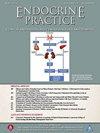甲状腺癌免疫治疗的前景与挑战。
IF 3.7
3区 医学
Q2 ENDOCRINOLOGY & METABOLISM
引用次数: 0
摘要
甲状腺癌的总体预后通常是良好的,尽管晚期和难治性病例表现出侵袭性行为和对标准治疗的抵抗,需要探索新的治疗方法。利用人体免疫系统靶向癌细胞的新兴免疫治疗策略在治疗某些甲状腺癌亚型方面显示出巨大的潜力。目前的免疫治疗方法主要包括免疫检查点抑制剂、CAR-T细胞疗法、肿瘤疫苗和免疫调节剂。免疫检查点抑制剂,如PD-1抑制剂,在ATC和PDTC患者中显示出显着的疗效,尽管耐药性和副作用仍然是重大挑战。CAR-T细胞疗法在血液病中的应用为甲状腺癌的治疗提供了有希望的见解,尽管其在实体瘤中的成功仍有待充分探索。肿瘤疫苗和免疫调节剂的研究也在取得进展,初步结果表明对甲状腺癌患者具有潜在的治疗价值。未来的研究应侧重于了解免疫微环境对治疗结果的影响,优化免疫治疗策略,探索联合治疗的潜力,为甲状腺癌患者提供更有效的治疗选择。本文综述了甲状腺癌免疫治疗的现状、机制、疗效及面临的挑战,并对今后的研究方向进行了展望。本文章由计算机程序翻译,如有差异,请以英文原文为准。
Prospects and Challenges of Immunotherapy for Thyroid Cancer
Background
Thyroid cancer generally boasts a favorable prognosis; however, advanced and refractory cases exhibit aggressive characteristics and resistance to conventional therapies, necessitating the investigation of innovative treatment modalities. Immunotherapy, which harnesses the body's immune system to target cancer cells, has shown considerable promise for specific thyroid cancer subtypes.
Objective
This review article aims to encapsulate the latest advancements in immunotherapy for thyroid cancer, examining its mechanisms, therapeutic efficacy, ongoing challenges, and the potential benefits of combination therapy approaches.
Methods
An extensive literature review and critical analysis of clinical trial data were conducted to inform this synthesis.
Results
The review reveals that immunotherapy strategies, encompassing immune checkpoint inhibitors, CAR-T cell therapy, tumor vaccines, and immunomodulators, are demonstrating efficacy in the treatment of thyroid cancer. Notably, checkpoint inhibitors have been particularly effective in anaplastic and poorly differentiated thyroid cancers, albeit with challenges such as treatment resistance and adverse effects. The application of CAR-T cell therapy, successful in hematologic cancers, provides a novel perspective for thyroid cancer treatment, although its efficacy in solid tumors requires further study. Additionally, research into tumor vaccines and immunomodulators is advancing, with preliminary evidence suggesting their therapeutic potential for thyroid cancer patients.
Conclusion
The recognition of the immune microenvironment's role in treatment responsiveness is pivotal for enhancing the care of thyroid cancer patients. This review underscores the significance of combination therapy as a means to optimize treatment outcomes and charts a course for future research endeavors to broaden the spectrum of effective treatment options available to thyroid cancer patients.
求助全文
通过发布文献求助,成功后即可免费获取论文全文。
去求助
来源期刊

Endocrine Practice
ENDOCRINOLOGY & METABOLISM-
CiteScore
7.60
自引率
2.40%
发文量
546
审稿时长
41 days
期刊介绍:
Endocrine Practice (ISSN: 1530-891X), a peer-reviewed journal published twelve times a year, is the official journal of the American Association of Clinical Endocrinologists (AACE). The primary mission of Endocrine Practice is to enhance the health care of patients with endocrine diseases through continuing education of practicing endocrinologists.
 求助内容:
求助内容: 应助结果提醒方式:
应助结果提醒方式:


